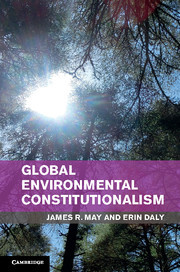Global Environmental Constitutionalism
Langue : Anglais
Auteurs : May James R., Daly Erin

This book examines the increasing recognition that the environment is a subject for protection in constitutional texts and for vindication by constitutional courts.
Reflecting a global trend, scores of countries have affirmed that their citizens are entitled to healthy air, water and land, and that their constitution should guarantee certain environmental rights. This book examines the increasing recognition that the environment is a proper subject for protection in constitutional texts and for vindication by constitutional courts. This phenomenon, which the authors call environmental constitutionalism, represents the confluence of constitutional law, international law, human rights and environmental law. National apex and constitutional courts are exhibiting a growing interest in environmental rights, and as courts become more aware of what their peers are doing, this momentum is likely to increase. This book explains why such provisions came into being, how they are expressed, and the extent to which they have been, and might be, enforced judicially. It is a singular resource for evaluating the content of and hope for constitutional environmental rights.
Acknowledgements; Introduction; Part I. Evolution and Existence of Environmental Constitutionalism; Section 1. The Nature of Environmental Constitutionalism: 1. The limitations of international law; 2. Domesticating environmental rights; 3. The value of constitutionalism; 4. The legitimacy of environmental constitutionalism; 5. The value of environmental constitutionalism; Section 2. Textualizing Environmental Constitutionalism: 6. Likelihood of constitutional instantiation of environmental rights; 7. Substantive individual environmental rights to a quality environment; 8. Other substantive environmental rights; 9. Environmental duties and responsibilities; 10. State environmental duties and policies; 11. Procedural constitutional environmental rights; 12. Presumptions about enforcing constitutional environmental rights; Part II. Vindication and Practices in Environmental Constitutionalism; Section 3. Adjudicating Environmental Constitutionalism: 13. Challenges in adjudicating environmental rights; 14. Justiciability in environmental constitutionalism; Section 4. Enforcing Environmental Constitutionalism: 15. Standing: who can enforce constitutional environmental rights; 16. Who is responsible? Identifying the appropriate defendant; 17. Timing: when is the right time to file a claim?; 18. Other unique procedural rules challenges; 19. Defenses and limitations; Section 5. Identifying Remedies and Practices in Environmental Constitutionalism: 20. State obligations under the international law framework; 21. The range of remedies; 22. Challenges to enforcement; Part III. Emergence and Future of Environmental Constitutionalism; Section 6. Water and Environmental Constitutionalism: 23. The uniqueness of water; 24. Manifesting constitutional recognition of rights to water; 25. Adjudicating constitutional rights to water; 26. Remedies, implementation, and enforcement; Section 7. Subnational Environmental Constitutionalism: 27. The nature of subnational environmental constitutionalism; 28. Textual subnational environmental constitutionalism; 29. Judicial receptivity to subnational constitutional environmental rights; 30. Establishing standing and identifying parties; 31. Determining remedies; 32. Standards of review; Section 8. Procedural Environmental Constitutionalism: 33. The nature of constitutional procedural environmental rights; 34. Textual procedural environmental rights; 35. Judicial receptivity to procedural environmental rights; 36. Enforcement and remedies; Section 9. Emerging Environmental Constitutionalism: 37. Right of nature; 38. Environmental sustainability; 39. Public trust; 40. Climate change; Section 10. Conclusion; Appendices: A. Substantive environmental rights; B. Individual environmental duties and responsibilities; C. State environmental duties; D. Environmental policy directives; E. Sustainable development, future generations, and public trust; F. Miscellaneous constitutional environmental provisions; G. Rights to water; H. Representative subnational environmental constitutionalism in Brazil and the United States; I. Procedural environmental rights: provisions regarding information, participation, and access to justice in environmental matters; Bibliography; Index.
James R. May is a Professor of Law, co-director of the Environmental Law Center, and Adjunct Professor of Graduate Engineering at Widener University School of Law, Delaware. He is the editor and a contributing author of Principles of Constitutional Environmental Law and has written or co-written more than seventy articles and book chapters relating to environmental and constitutional law. He is a former federal litigator, NGO director and engineer.
Erin Daly is vice dean and Professor of Law at Widener University School of Law, Delaware. She has written extensively on comparative constitutional law and transitional justice issues throughout the world. She has recently published Dignity Rights: Courts, Constitutions, and the Worth of the Human Person (2012). She is co-author, with Jeremy Sarkin, of Reconciliation in Divided Societies: Finding Common Ground (2010).
Erin Daly is vice dean and Professor of Law at Widener University School of Law, Delaware. She has written extensively on comparative constitutional law and transitional justice issues throughout the world. She has recently published Dignity Rights: Courts, Constitutions, and the Worth of the Human Person (2012). She is co-author, with Jeremy Sarkin, of Reconciliation in Divided Societies: Finding Common Ground (2010).
Date de parution : 06-2016
Ouvrage de 428 p.
15.1x23 cm
Disponible chez l'éditeur (délai d'approvisionnement : 14 jours).
Prix indicatif 34,17 €
Ajouter au panierDate de parution : 11-2014
Ouvrage de 428 p.
15.2x22.9 cm
Disponible chez l'éditeur (délai d'approvisionnement : 14 jours).
Prix indicatif 103,03 €
Ajouter au panierThème de Global Environmental Constitutionalism :
© 2024 LAVOISIER S.A.S.
